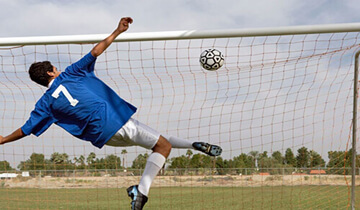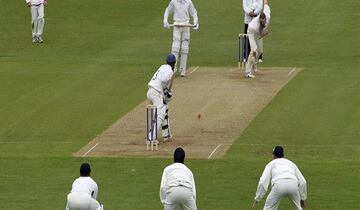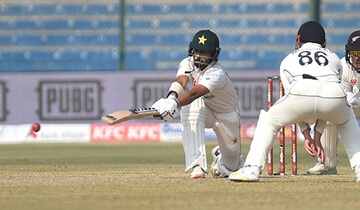A winger is a wide attacking player positioned on the left or right side of the pitch. Their main role is to provide width to the attack and deliver crosses into the penalty area. Wingers are often some of the fastest and most skillful players in a team, using their pace and dribbling ability to beat opposing defenders.
Key responsibilities
- Provide width to stretch the opposition defense
- Deliver crosses and cutbacks into the penalty area
- Dribble past defenders and create chances
- Link up play between midfield and attack
- Track back to support the full-back defensively
Types of wingers
There are two main types of wingers - traditional wingers who stay out wide and inverted wingers who cut inside. Traditional wingers stay near the touchline to deliver crosses. Inverted wingers cut inside onto their stronger foot to shoot rather than cross. Most modern teams deploy inverted wingers or playmakers out wide rather than old-fashioned touchline-hugging wingers.
Where Wingers Play on the Field
Wingers operate on the flanks, close to the sidelines on either side of the central striker(s).
Wingers are positioned high and wide as attacking midfielders or forwards. They stick to the touchlines on either side of the pitch to provide width to their team’s attack. This stretches the opposing defense and creates space through the middle for strikers and attacking midfielders to exploit.
The winger’s main role is to beat defenders and deliver crosses into the box for teammates to attack. They need to be fast, skilled dribblers with an accurate crossing ability. Stamina is also key to get up and down the flank all game long.
Wingers can play on either side, but often specialize on their stronger foot side. This allows them to cut inside and shoot more easily. But it also makes their intentions and movement easier to read by defenders.
They can play on their natural side matching their dominant foot (traditional winger). Or on their weaker side (inverted winger).
- Traditional winger - Plays on the side matching their dominant foot (e.g. right footed on right wing). Their main role is to stay wide and deliver crosses.
- Inverted winger - Plays on opposite flank from dominant foot (e.g. right footed on left wing). Their threat is cutting inside to shoot or create chances. This is harder for defenders to deal with.
The type of winger used depends on tactics and personnel. Traditional wingers provide natural width and classic crossing ability. Inverted wingers are less predictable and can be used to overload a flank.
Modern tactics have seen more use of inverted wingers. Famous examples include Arjen Robben (left footed playing on right) and Gareth Bale (right footed on left). But the traditional winger role still remains an important tactical option.
Main Role and Responsibilities of a Winger in Soccer
Provide Width to Stretch the Defense and Create Space Centrally
One of the primary roles of a winger is to provide width in attack. By staying near the touchline and making runs down the flank, the winger forces the opposing fullback and wide midfielders to track their movement. This has the effect of stretching the defense horizontally and opening up space between defenders centrally.
The central attacking players like the number 10 and strikers can take advantage of this increased space to receive passes, turn and dribble at defenders. The winger’s width drags defenders out of position and creates passing lanes through the middle third for the central midfielders to exploit.
By receiving the ball wide in advanced positions, the winger also forces the near center back to shift across to close them down. This can create a 2v1 overload against the fullback and open a passing option for the winger to cross or cut the ball back into the box. Their ability to isolate and beat the fullback 1v1 gives the team a crucial attacking threat from out wide.
Beat Defenders 1v1 and Deliver Crosses into the Box
Perhaps the most exciting role of a winger is their ability to beat defenders in 1v1 situations using pace, trickery and skill moves like step overs, feints and shoulder drops. Wingers tend to be some of the most skillful dribblers in a team, capable of dazzling runs beating multiple opponents.
Once in advanced positions near the byline, the winger will look to deliver crosses into the penalty area for attackers to attack. Low drilled crosses aimed at the front post or aerial crosses to the back post are the most common. Quality delivery from the flanks and excellent crossing technique are highly desired winger attributes.
The end product of goals and assists from wide areas is arguably the winger’s most identifiable contribution to the team. Their pace and trickery beating defenders creates opportunities to deliver dangerous balls into the box. Wingers can rack up high assist numbers from crossing if their team has strong aerial threats like a target man striker.
Assist Strikers with Scoring Opportunities through Passing, Crossing and Link-Up Play
In addition to beating defenders themselves, wingers have a responsibility to create chances for the team’s strikers and forward players. This primarily involves passing and crossing into dangerous areas for attackers to have scoring opportunities.
Wingers can slide through balls in behind the defensive line for fast strikers to run onto. Early floated crosses to the back post or hard low crosses drilled into the front post area are also common. The winger must have excellent vision, timing and crossing accuracy to regularly create chances for teammates.
Link-up play with the striker is another important way the winger can assist with creating chances. Wall passes, take overs and quick one-twos, can allow the winger or striker to get in behind the defense. The winger’s chemistry and understanding with the strikers is crucial for building an effective attacking relationship.
Create and Take Chances to Score Goals Themselves
While wingers are chiefly creators, they are also expected to contribute goals. Wingers can use their pace and dribbling to cut inside from the flank onto their stronger foot and shoot for goal. Long range shooting and attempting to curl efforts into the far corner are trademark winger goals.
Staying high and wide as an outlet option on the counter attack also allows the winger to break quickly upfield and run directly at the defense. The winger’s objective is to carry the ball into the box and finish the move themselves with a powerful low shot. Their goal scoring from the flanks can be a huge asset for the team.
Making late runs from deep at the back post to arrive onto crosses and loose balls in the box is another way wingers find chances to score. Their timing and movement between the posts is crucial to lose their marker and take advantage of any defensive lapses. Goals from wingers take pressure off the strikers.
Help Build Attacks from Midfield Up the Field
While wingers primarily operate in the final third, they also have a responsibility in midfield to help progress the ball upfield and build attacks from deeper areas. This requires being patient in possession and linking passes with midfielders and fullbacks.
Dropping short and infield into pockets of space to receive vertical passes allows the winger to turn and carry the ball forward at pace toward the final third. The winger must recognize when to stay wide to stretch the play and when to drift inside to overload central areas and combine.
Wingers receive lots of passes from their fullback who overlaps beyond them. Simple lateral passes keep possession and shifts the point of attack from side to side. The winger and fullback can play give-and-goes to penetrate centrally. Providing a midfield outlet and linking play is essential.
Track Back to Support the Defense When Possession is Lost
While wingers have exciting attacking qualities, they must also fulfill their defensive duties, particularly dropping back to support their fullback when possession is lost. This usually means dropping into a flat midfield line of four and shuffling across to close down space on their flank.
Tracking overlapping opposition fullbacks and preventing them from delivering crosses is a key defensive job. The winger may also be called upon to temporally fill in at fullback if their teammate has pushed very high upfield. Their effort and stamina to recover defensively is highly valued.
Tactically disciplined positioning and protecting space out wide is crucial when the team is defending leads. The winger cannot afford to be caught too far forward or they risk leaving the fullback exposed in a dangerous 2v1 overload. Their off-ball work rate and commitment is vital to maintain defensive team shape and compactness.
Key Attributes and Skills of a Modern Winger in Soccer
Pace and Acceleration to Beat Defenders
One of the most important attributes for a winger is pace and acceleration to beat defenders. The ability to explosively accelerate and reach top speed quickly allows wingers to get past fullbacks and create scoring chances. The modern game demands wingers who can blow by defenders and stretch the field.
Wingers like Kylian Mbappe, Sadio Mane, and Vinicius Jr. demonstrate how elite pace can terrorize defenses. Their explosive acceleration from a standing position or when receiving the ball gives them a dynamic advantage against most fullbacks. Combining top-end speed with rapid changes of direction and feints makes the fastest wingers nearly impossible to defend in isolated situations.
Dribbling Ability to Take On Fullbacks
Excellent dribbling technique compliments a winger’s pace by allowing them to maintain control when beating defenders at speed. The best dribblers can manipulate the ball while moving at top speed, making subtle feints and rapid turns to unbalance their markers.
Wingers like Neymar, Riyad Mahrez, and Kingsley Coman showcase dribbling mastery with their close ball control and array of skills. Their ability to dribble past multiple defenders and break down a packed defense is invaluable for creating and finishing attacking moves. Even against the most disciplined defensive shapes, elite dribbling talent can generate scoring chances through individual brilliance.
Crossing Technique and Passing Accuracy
Although their chief role is stretching defenses, wingers also provide width to spread the attack and deliver dangerous crosses. Precise, well-timed crosses into the box are a valuable way for wingers to contribute goals and assists.
The elite modern winger has excellent crossing technique to whip in a variety of balls depending on the situation. Driven, low crosses are useful to find late-arriving runners at the far post. Lofed, aerial crosses can target tall target strikers like traditional Number 9s. Early crosses fired in before defenses are set are also a great weapon.
Besides crossing, wingers also showcase their passing accuracy via combination play and through balls for overlapping fullbacks. Their chemistry and link-up play with other attackers helps facilitate possession and build-up through the wings.
Stamina to Get Up and Down the Pitch
Given the demands of their position, top-class wingers also showcase tremendous stamina and endurance. Their role requires non-stop running to make attacking runs and track back defensively once possession is lost.
The fittest wingers have the motor to make lung-busting runs all game long. Their relentless work rate and ability to run at top speed for 90 minutes straight is critical to stretching tiring defenses late in matches. Maintaining intensity and focus through fatigue also exemplifies their dedication and mental toughness.
Decision-Making in the Final Third
In addition to technical qualities, smart decision-making is required to translate a winger’s dribbling and passing into final product. Though they are given license to take on defenders, wingers must also recognize when to pass or shoot at the right moment.
Decisive wingers like Mohamed Salah, Raheem Sterling, and Serge Gnabry balance direct running with intelligent combination play. Their composure and precision in the final third shines through in their ability to make the right choice to finish off chances. Their clever movement and positioning also rewards teammates by creating space and openings to exploit.
Pressing Ability to Win Back Possession
While their attacking attributes are most visible, modern wingers are also expected to contribute defensively. In contemporary pressing systems, wingers play an important role in initiating pressure when possession is lost.
When closing down opponents, wingers use their pace and stamina to deny easy passes and time on the ball. Their athleticism allows them to cover ground quickly to support midfield pressure. Aggressive wingers are able to force rushed decisions and inaccurate passes from defenses, creating turnovers high up the pitch.
The well-rounded modern winger combines pace, dribbling technique, delivery, intelligent movement, stamina, and defensive work rate. Elite players like Sadio Mane embody the complete package with their multifaceted skillset. Their unique attributes allow them to beat defenders, link play, and create and finish chances while also contributing to regaining possession. The modern game demands wingers who can dominate in every phase of play.
Famous Wingers Through History
George Best
George Best is considered one of the most talented wingers in football history. Nicknamed “the fifth Beatle” for his popstar-like popularity, Best played for Manchester United and Northern Ireland in the 1960s and 70s. Known for his pace, dribbling skills, and goalscoring ability, Best helped United win the First Division title in 1965 and 1967 and the European Cup in 1968. However, his career was shortened due to his issues with alcoholism.
Garrincha
The Brazilian winger Garrincha is renowned as one of the most talented dribblers in football history. His skill with the ball at his feet was legendary - he would often beat multiple opponents with ease. Garrincha was a key part of Brazil’s 1958 and 1962 World Cup winning squads. His unique running style earned him the nickname “the angel with bent legs”. Sadly, like Best, Garrincha’s career was also damaged by alcohol abuse.
David Beckham
Former England captain David Beckham redefined what it meant to be a winger. While blessed with pace and dribbling ability like traditional wingers, Beckham became famous for the accuracy and bend of his crosses and free kicks. His right foot could whip dangerous balls into the box for teammates to attack. Beckham enjoyed success at clubs like Manchester United, Real Madrid and LA Galaxy, and his celebrity turned him into a global icon.
Top Wingers in the World Today
Today, there are several incredibly talented wingers playing at the highest levels of professional soccer. These players possess exceptional speed, dribbling ability, and finishing skills that make them a constant threat on the flanks. Some of the top wingers in the world currently include:
Mohamed Salah
The Egyptian star has been phenomenal since joining Liverpool, winning the Premier League Golden Boot twice. His lightning quickness, close control, and clinical finishing make him a nightmare for defenders.
Sadio Mané
Salah’s teammate at Liverpool, the Senegalese winger is another elite dribbler and scorer. His direct runs down the left wing and ability to cut inside and finish with both feet make him a constant danger.
Kylian Mbappé
Despite his young age, the French phenom is already one of the most dominant offensive talents around. His devastating pace and composure in front of goal see him shatter scoring records year after year for both club and country.
Raheem Sterling
The English international has added prolific goalscoring to his repertoire in recent years, becoming a key cog in Manchester City’s domestic dominance. His elusive dribbling and improved finishing make him a handful.
Leroy Sané
Sterling’s teammate at City, the German flyer is a whirlwind of pace and tricks. When healthy, he is nearly impossible to contain one-on-one out wide.
Heung-Min Son
The South Korean has emerged as Tottenham’s most dangerous attacker with his direct running and long-range shooting ability cutting in from the left side. His speed and technical skill create problems for any defender.
There are many other talented wingers currently starring for top clubs and countries. But Salah, Mané, and Mbappé have consistently proven themselves to be among the very best thanks to their breathtaking skills, eye for goal, and big game mentality.
This collection of electrifying wingers has provided some of the most highlight-reel moments in recent years. Their dominance on the flanks makes them vital contributors for their clubs.
Conclusion
Wingers have evolved to become some of the most exciting and dangerous players in the modern game. While they were once relegated to simply hugging the touchline and providing crosses, wingers now have a much more well-rounded role. The best modern wingers combine pace, dribbling ability, creativity, goalscoring prowess, and defensive work rate to dominate matches from their wide positions. Players like Salah, Mane, and Mbappe demonstrate how wingers can control games and decide outcomes from the flanks.
The increased tactical flexibility of inverted wingers who cut inside also makes modern wide men harder to defend. Wingers must work relentlessly to provide width to stretch defenses in attack and support fullbacks in defense. Their non-stop running and individual brilliance gives teams a vital unpredictable threat against even the most organized defenses. As soccer continues to evolve, top teams rely heavily on elite wingers to beat opponents in tight spaces and break down stubborn defensive blocks. With their game-changing attributes, it is clear why wingers like Mbappe are now considered among the best players in the world and coveted by top clubs willing to pay record transfer fees for their services.







































